Cinegy Stream Switcher Control
Reading time ~6 minutes
The Cinegy Stream Switcher Control application connects to the Cinegy Stream Switcher service via the HTTP protocol and allows the user to manage and control the status of the streams. Both components can be installed on the same machine. Otherwise, Cinegy Stream Switcher Control requires access to the computer running the Cinegy Stream Switcher service but does not require a physical connection to the IP network.
Cinegy Stream Switcher channel represents a configuration of two stream source servers (main and backup) to receive RTP/UDP streams and one output server performing the broadcast of a stream. In case of the main source server failure, the broadcast is switched to the backup server. Switching to the backup source server is performed according to the specified alerts settings.
Configuration
|
To launch this application, go to Start > Cinegy > Stream Switcher Control or use the corresponding desktop shortcut. The following window will open: |
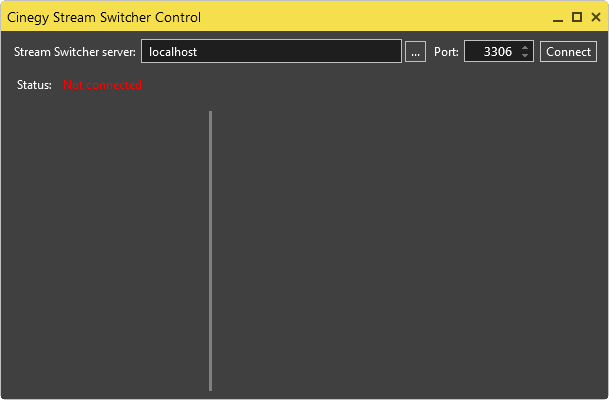
Here define the following settings:
-
Stream Switcher server – the computer where the Cinegy Stream Switcher service is installed. You can connect to localhost if the service is installed on your local computer, or enter the IP address or the network name of the server in case it is being used remotely. You can use the
 button to select the server from the list of available computers in the network:
button to select the server from the list of available computers in the network: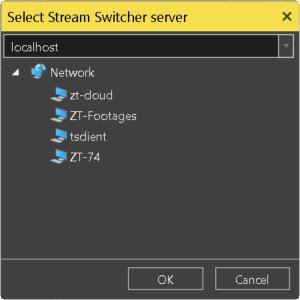
-
Port – define the Cinegy Stream Switcher control port.
NoteThis value should be equal to the "Stream Switcher Control port" value set in the Cinegy Stream Switcher Configurator. Otherwise, the connection will not be established.
|
Press the "Connect" button to start the connection to the Cinegy Stream Switcher service. Once connected, it looks like this: |
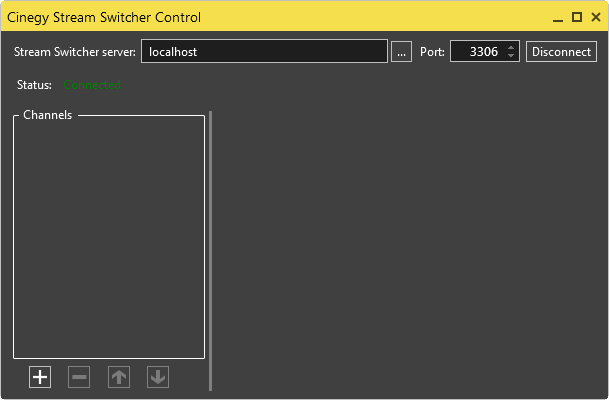
The connection status is shown in the "Status" field.
Stream Settings
To add a new channel to the list, press the  button; the following "Stream Settings" window will be opened:
button; the following "Stream Settings" window will be opened:
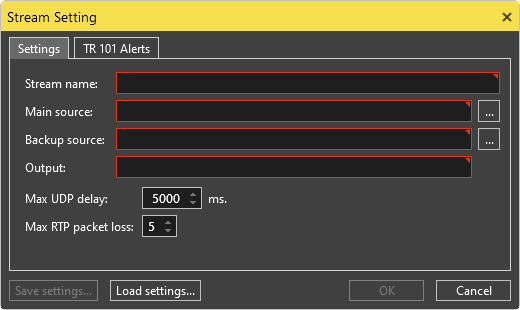
|
Note
|
Incorrectly filled-in or empty fields are highlighted with a red bounding box. Hovering the mouse pointer over such a field displays a tooltip describing the problem. The settings cannot be applied unless all values are valid. |
Here define the following settings:
-
Stream name – specify the channel name.
-
Main source – define the RTP or UDP URL for the source stream from the main source server. To do this, either use the keyboard or press the
 button to select a video stream registered on the specified server by the Cinegy Route Directory Service using the integrated Cinegy Route browser that appears:
button to select a video stream registered on the specified server by the Cinegy Route Directory Service using the integrated Cinegy Route browser that appears: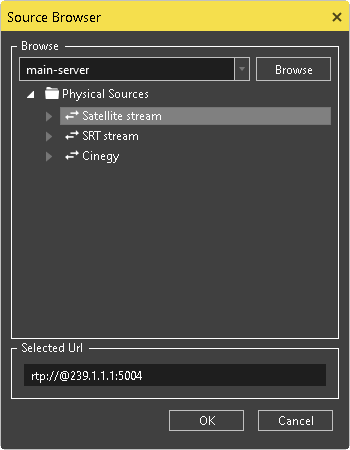 Note
NoteUse of the integrated Cinegy Route browser requires Cinegy Route Browser v15 and above installed and available on the machine running Cinegy Stream Switcher Control. NoteOnly streams marked as "Visible" for the current user will be available for browsing. Select the required video stream and press "OK". It will be automatically converted to RTP/UDP URL:
 Important
ImportantRefer to the RTP/UDP/SRT URL Format article for more information about the IP video URL format. -
Backup source – define the source stream from the backup source server in the same way as you did for the main source.
-
Output – specify the output stream.
-
Max delay – define the maximum delay time of RTP/UDP packets in milliseconds. If the actual delay of packets exceeds this value, the stream is considered to be absent.
-
Max RTP packet loss – define the maximum number of missing RTP packets allowed per stream.
Having configured the necessary parameters, the window will look as follows:
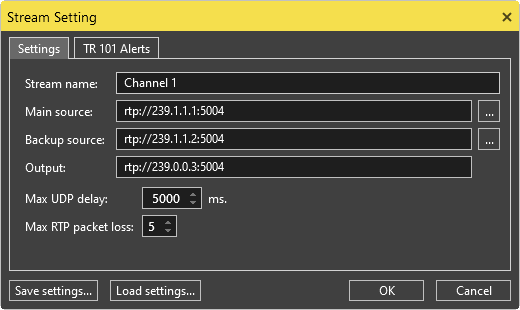
|
Press the "Save settings" button to save the configured settings in .SSX file format for future use: |
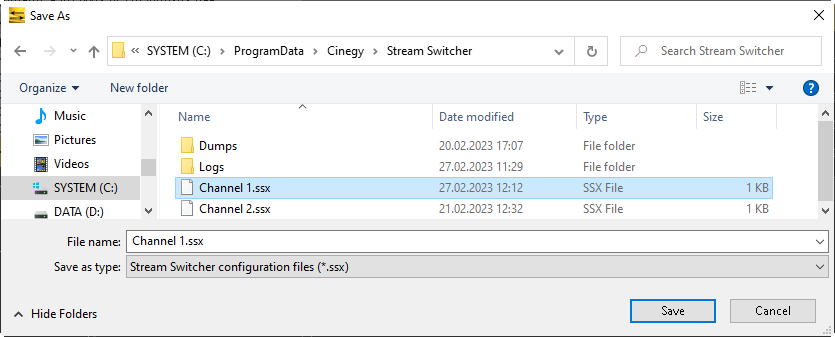
|
Press the "Load settings" button to load the previously saved configuration. |
TR 101 Alerts
In the "TR 101 Alerts" tab, a user can define the actions to be taken in the event of certain problems with the stream, defined and assessed in accordance with the standard ETSI TR 101 290:
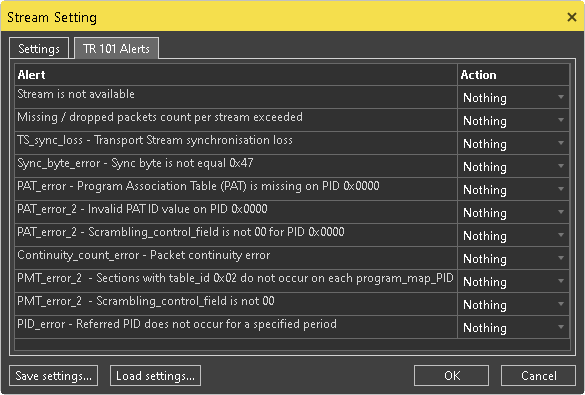
In the "Alert" column, select the desired alert, and in the corresponding "Action" drop-down list, select the action that will be performed:

The following actions are possible:
-
Nothing – no action is performed.
-
Notify – the SNMP trap is sent to the preconfigured destination.
-
Switch to backup – the stream is switched from the main to the backup source server.
The most common configuration is as follows:
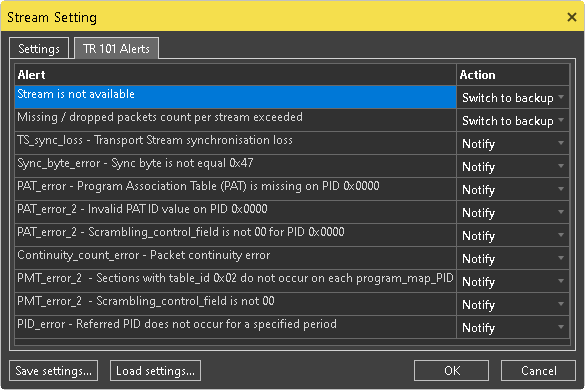
Switching to the backup source is performed in case of stream absence and when the number of missing/dropped packets per stream is exceeded. The boundary parameters for these two alerts are set up in the "Settings" tab. The other alerts are Digital Video Broadcasting (DVB) tables data-specific, and can be configured according to your needs.
|
Important
|
Please refer to the Digital Video Broadcasting (DVB) standard definition for details about DVB parameters. |
Having configured all the necessary settings, press the "OK" button. The settings will be applied, and the configured channel appears in the "Channels" list.
Operating
This paragraph describes how to work with the Cinegy Stream Switcher channels.
Channels List
The configured Cinegy Stream Switcher Control shows the status of the channels and allows you to manually switch and start/stop the source streams broadcast.
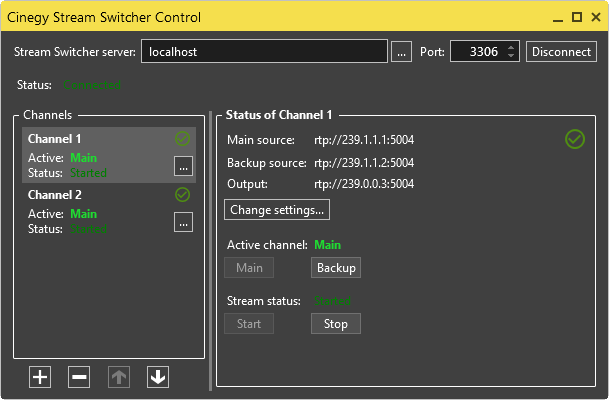
|
To add a channel from the list, use the "Plus" button. |
|
To remove a channel from the list, use the "Minus" button. |
|
To change the order of channels in the list, use the "Up" or "Down" arrow buttons. |
Select the desired channel in the "Channels" list; its configuration and status will be displayed in the "Status" panel. The  sign indicates that the broadcast of the stream is on air.
sign indicates that the broadcast of the stream is on air.
To change the channel settings, use the  button for the corresponding channel from the list or use the
button for the corresponding channel from the list or use the  button on the "Status" panel. Applying the changes will restart the Stream Switcher engine and reset the current switcher position to the default main channel. You will be prompted to confirm your intention to restart the engine with the appropriate message:
button on the "Status" panel. Applying the changes will restart the Stream Switcher engine and reset the current switcher position to the default main channel. You will be prompted to confirm your intention to restart the engine with the appropriate message:
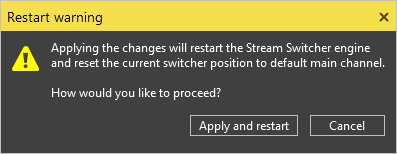
Switching to Backup Source
The "Active channel" field shows the currently active playout server: main or backup. In case of stream loss, the transmission will be automatically switched to the backup server. The  sign indicates that there are problems with the main source and that the backup source is now active:
sign indicates that there are problems with the main source and that the backup source is now active:
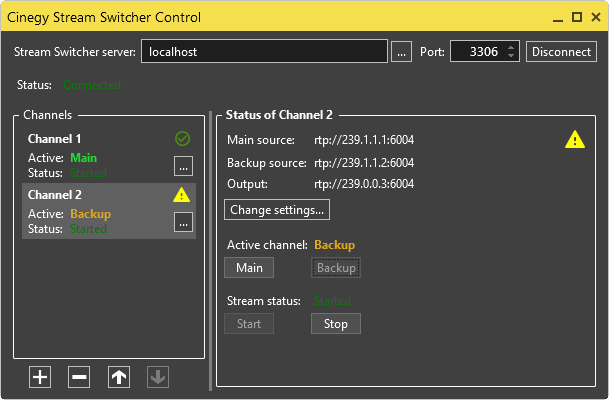
To manually switch to the backup source, press the "Backup" button.
Stream Status
The "Stream status" field shows whether the stream broadcast is started or stopped. To manually stop the broadcast of the stream, use the "Stop" button. You will be prompted to confirm your intention to stop the stream broadcast with the corresponding message:
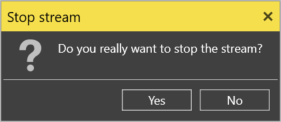
The  sign indicates that the broadcast of the stream is stopped:
sign indicates that the broadcast of the stream is stopped:
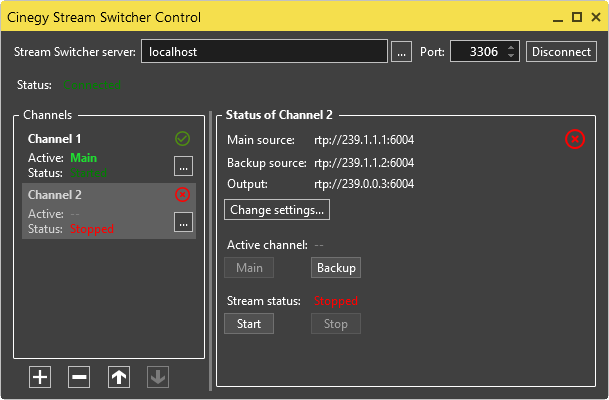
Use the "Start" button to manually start the stream broadcast.
License Error
If no software license key file is available or a license file on a detected hardware dongle is not found, or the dongle is not connected, the "Stream status" field will indicate that no license is available.
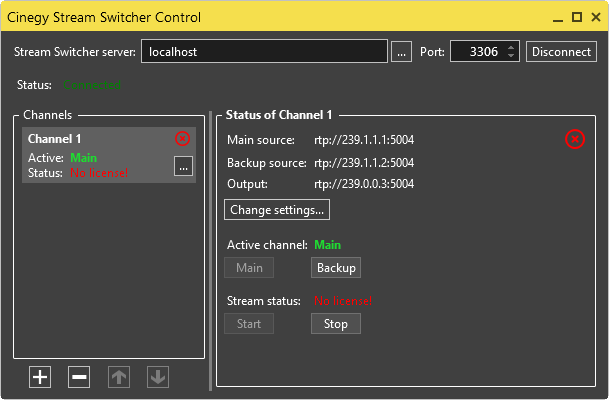
|
Important
|
Refer to the Licensing paragraph for information on Cinegy Stream Switcher licensing. |





